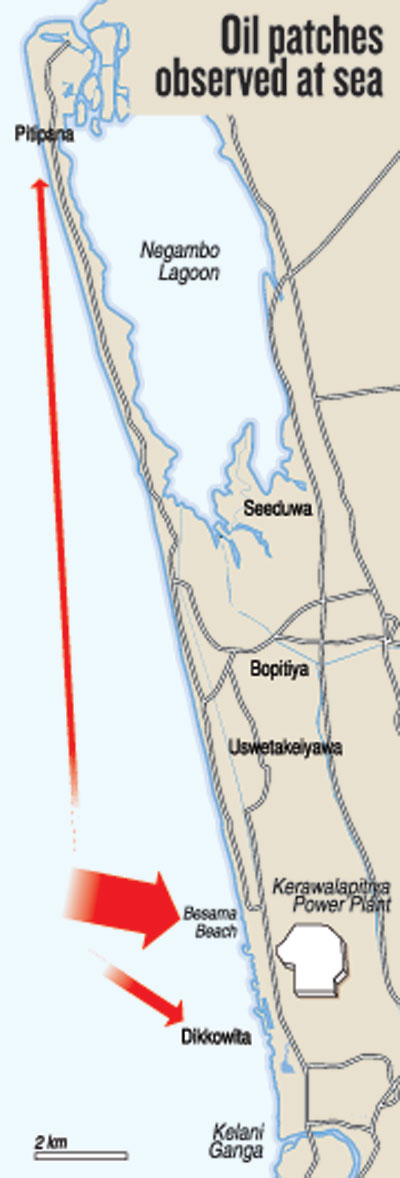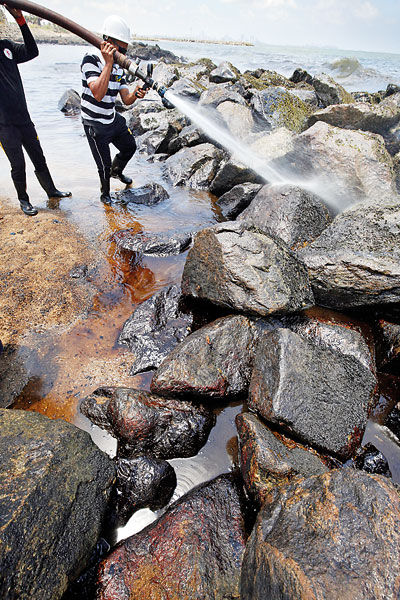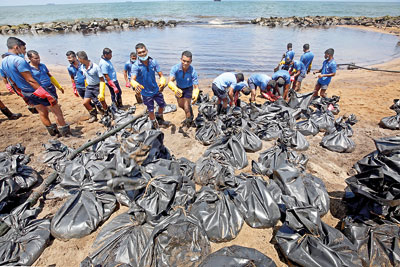News
Impact from oil leak on coastal ecosystem to take months- NARA
It may take months to ascertain the impact from the Muthurajawela oil leak on the coastal ecosystem, said a senior official of the National Aquatic Resources Agency (NARA).

Besama Beach - ‘Ground Zero’ filled with oil from the leak.
NARA Senior Scientist- Environmental Studies Division, Dr. Deepthi Amaratunga, said, “Initial investigations by NARA has observed small floating patches of oil from Dikowita to Pitipana, along the coast, and a full impact report will take longer to asses.”
The oil leak occurred on Saturday (8), when CPO Larisa Artemis, a Marshal Island flagged oil tanker was unloading furnace oil about six nautical miles off the coast. The oil is pumped from ship to ashore, via an underwater pipeline.
NARA said it will conduct periodic checks in the coming months to map the impact. ‘Ground Zero’ of the oil spill is ‘Basama beach’ in Uswetakeiyawa, with its natural shallow water ‘pool’ made of rocks, is a popular bathing spot for locals and foreigners alike.
Ceylon Petroleum Cooperation (CPC) Chairman Dammika Ranatunga told the Sunday Times that, prompt action was taken to stop the pumping process and spray chemical oil dispersants on oil patches which had reached the surface.
He said an independent investigation is underway to ascertain the cause of the leak.
He said prompt action by the Marine Environmental Protection Agency (MEPA), the Sri Lanka Navy (SLN), the Sri Lanka Coast Guard (SLCG), the Sri Lanka Army, the Sri Lanka Air Force and Police, and their round-the-clock efforts helped contain the oil spill and minimise any damage.
Meanwhile, CPC sources, who wished to remain anonymous, alleged that the pipeline which leaked has been used heavily in the recent past, as the older pipelines are not operational. As such, due to the high frequency of use, the pipelines maintenance schedule may have been interrupted.
SLCG sources told the Sunday Times that an “Oil spill response team” stationed at the SLCG station in Dikowita was placed on alert on Saturday (8), but the team had to wait till Sunday morning when they received the deployment order from MEPA.
MEPA is the regulatory body which directs other State actors for oil and chemical spills at sea. SLCG sources said that, had there not been a delay in communication, the SLCG and SLN could have brought to bear more resources to aid the containment effort at an earlier stage.
MEPA Deputy General Manager M.A.G. Priyantha who was at the ‘Besama beach’ site on Friday (13), told the Sunday Times that on the 8th, he CPC had informed MEPA that the situation was “under control”. He said MEPA had mobilized as soon as a request for assistance was made. Mr. Priyantha said, they set up an ‘Operations Room’ with the relevant government stakeholders who made up the ‘Incident Management Team’, as per MEPA’s contingency plans.
The SLCG deployed the newly commissioned “SLCG Samudra Raksha” and “SLCG Samaraksha” Fast Patrol Vessels (FPV), equipped with oil spill containment and recovery equipment, to the Dikowita coast to assist in the containment efforts.
The SLN provided the bulk of the manpower and some of the Personal Protective Equipment (PEP). The CPC had provided earth-moving equipment, specialized bowsers and high pressure cleaning equipment to remove the oil.
The Armed Forces and the SLCG provided nearly 400 personnel including the “Oil Spill Response Tteam” specially trained to handle spills less than 50 tons. MEPA had fielded a 35-man Response Team for the cleanup operation. Volunteers from “Pearl Protectors’, a group focused on protecting the marine environment, also joined in the cleanup efforts near ‘Basama beach’.
Hotels along the stretch of beach were not directly affected by the spill, but expressed concern that a bigger oil leak may damage tourism in the coastal stretch.
In 2015, kerosene leaked from the pipeline running to the Muthurajawela storage facility, causing damage to habitat in the area.

Navy personnel and CPC employees use high pressure water guns to remove oil off the rocks. Pix by M.A. Pushpa Kumara

Personnel from the Sri Lanka Navy and Coast Guard pack oil drenched sand in to polyethylene sacks to be sent to the CPC
| MEPA to take CPC to courts | |
| The Marine Environmental Protection Agency (MEPA) has lodged a complaint against the CPC, regarding the oil leak at Muthurajawela, at the Pamunugama Police Station. MEPA has begun its own inquiry and recorded statements from CPC officials and from the oil tanker’s crew, said MEPA DGM (Operations) M.A.G. Priyantha. He added that MEPA will take Legal action against the CPC once Police investigations and its own inquiry is concluded. The amount of oil that leaked and the related loss incurred is yet to be ascertained. |

